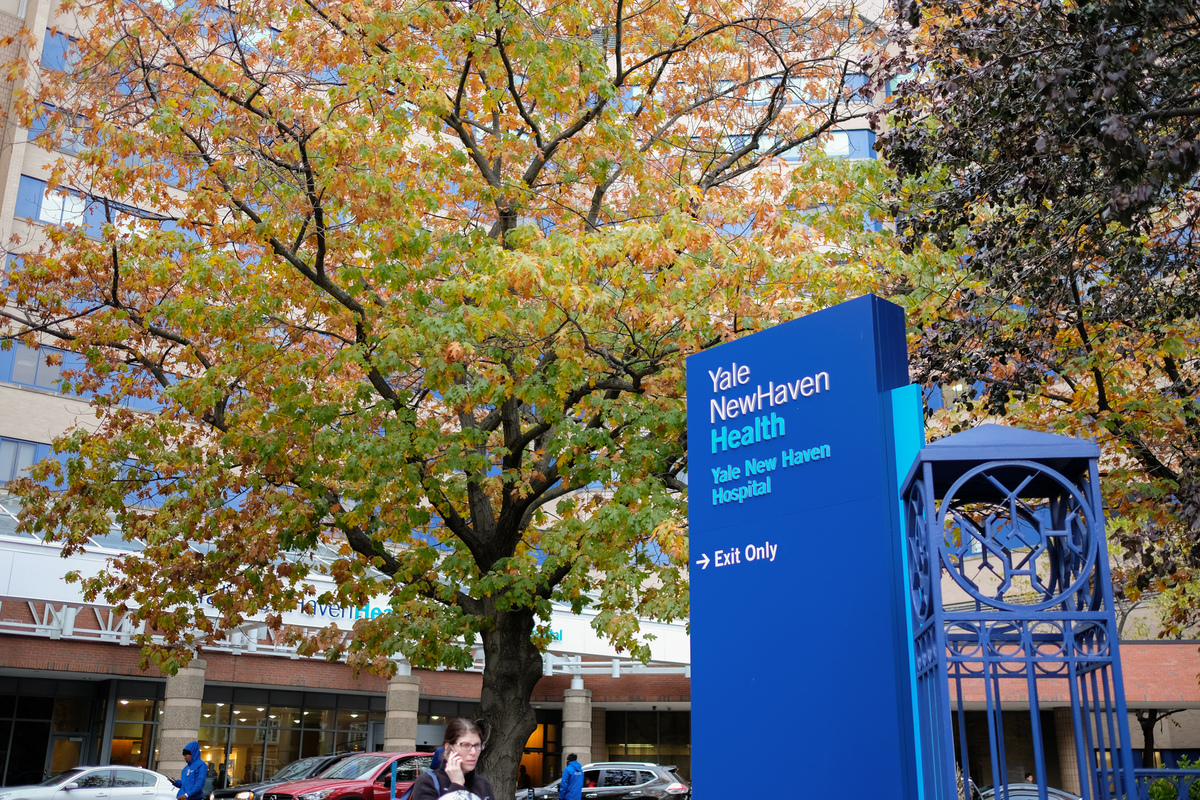As two-year anniversary of first COVID-19 admission at YNHH approaches, health system launches new initiatives
In a press conference on March 8, YNHH leaders updated the public on recent COVID-19 statistics, the hospital purchase proposal and their donation plan to support Ukraine.

Yale Daily News
At a Tuesday press conference, Yale New Haven Health officials reflected on how its hospitals have navigated pandemic healthcare over the past two years — as the system looks to continue serving patients amid new and emerging challenges.
Following brief forewords from former YNHH Chief Medical Officer Marna Borgstrom, current YNHH CMO Thomas Balzacek and YNHHS President Christopher O’Connor, the conference included the opportunity for attendees to ask questions and express their healthcare concerns. Among the YNHH updates and questions addressed during the webinar were the changing landscape of COVID-19 regulations, the system’s plan to acquire three hospitals from Prospect Holdings and its donation of $1 million in relief supplies to Ukraine.
“We will need to remain vigilant because there is the possibility of future waves and the emergence of additional variants,” Balzacek said. “As we continue to pivot toward continuing to give other services to our community … there are also other crises that collectively require our attention.”
The panelists noted that there is cause for celebration despite the enduring pandemic, with Borgstrom citing dwindling infection rates and thanking medical staffers for their “selfless” contributions during times of peak infection, such as the holidays.
Of the 58 patients currently admitted in YNHHS for COVID-19, seven are in the intensive care unit and three are on ventilator support. Thirty-three are at Yale New Haven Hospital, 17 are at Bridgeport Hospital, two are at Greenwich Hospital and six are at Lawrence + Memorial Hospital.
And “for those of you out in western Rhode Island, there are no patients in Westerly,” Borgstrom added.
Balzacek emphasized that the YNHH COVID-19 mortality rate — at 8.2 percent — was not only significantly less than the national average of 24.6 percent, but also remained constant across different ethnicities and races. Moreover, out of the 21,000 patients administered to the system from COVID-19, all but 1,700 have been discharged safely, according to Balzacek.
Recognizing that many communities are grappling with mental health challenges during the pandemic, YNHH has also ramped up behavioral health services that allow patients to participate in a variety of counseling and support programs.
There has been an “uptick in employees seeking help due to increasing pressure and strain,” said Senior Vice President Vin Petrini, who noted that these support programs extend beyond pediatrics to also cater to adults and employees.
With declining rates and several states planning to lift masking regulations in indoor spaces, Balzacek nonetheless emphasized that “masks are a two-way street,” reaffirming the importance of masking during travel and in large-crowd settings. He emphasized the importance of respecting the mandates and regulations imposed by individual business owners, and he acknowledged the recent increase in “unruly behavior” from some community members in response to COVID-19 guidelines.
He also highlighted the importance of people continuing to educate themselves throughout the “evolving” pandemic to prevent misinformation, drawing attention to the fact that “there’s a difference between giving advice when you don’t know the answer and … giving false advice when the answer is known.”
When asked whether there was a seasonality to COVID-19, Balcezak said that “it’s probably going to be like many of the other respiratory viruses” that are “cyclical in the winter.” He noted that in the wintertime, there is less humidity and people tend to crowd together closely, which allows viruses to spread more easily.
O’Connor also mentioned that the health system will be donating over $1 million in medical supplies to support the people of Ukraine.
“In the past when crisis has struck, our team has stepped up to do whatever we can to offer support,” said O’Connor. “This time, we will be offering our support in a donation of protective gear to the U.S Cooperative for International Patient Programs. Our employees share in the pain of the Ukrainian people and are hoping to do what we can with this donation to reduce some of the immediate suffering.”
O’Connor noted that the health system will continue to monitor and assess the situation and find other ways to offer aid and support. A news release that was sent out during the conference elaborated that the personal protective gear donated included surgical masks, gowns, gloves and N95 masks.
Medical institutions and other health-related environments will continue to require masking under federal mandate.







